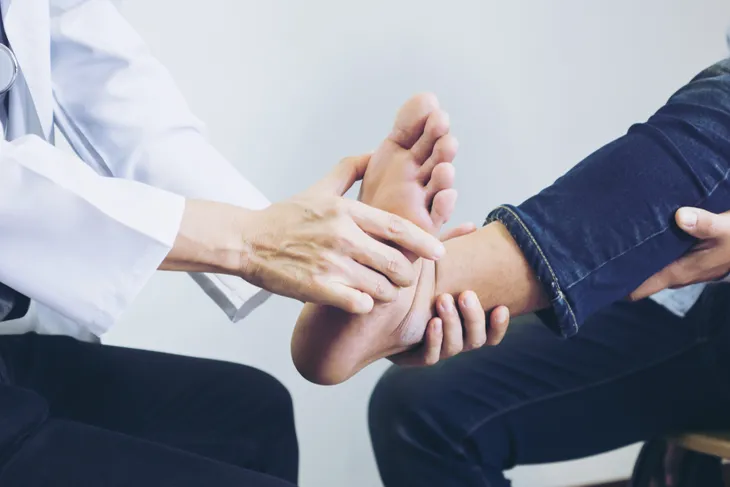Painful, debilitating, and very unpredictable are a few words to describe muscle spasms. Muscle spasms are a universal part of the human experience, and though they can happen at any time, there are preventative measures that you can take, and treatment options that you can lean on, to minimize their symptoms.
Today, we’re going to take a deep dive into all things muscle spasms! What are they, what are their symptoms, what causes them, how do you treat them, and what can you do today to prevent them? Read more to find out!
Symptoms
Some call them muscle spasms, some call them muscle cramps, but everyone experiences these uncontrollable occurrences in much the same way. Spasms can affect any of your muscles and are typified by a sudden and involuntary contraction, and an inability to relax the affected muscle.
Spasms most commonly manifest in the thighs, calves, feet, hands, arms, and abdomen, and can range in intensity from mild twitches to intense pain. To the eye, the affected muscle may visibly twitch and tighten. Muscle spasms can last just a few seconds, or endure for as many as 15-minutes, and they may even recur multiple times before subsiding.
Who Gets Muscle Spasms?
Muscle spasms are common and they can happen anytime, anywhere such as when you’re sleeping, sitting, walking, or exercising. So, who can get them? The Cleveland Clinic says anyone can develop muscle spasms.
Whether you’re young, old, or if you lead a sedentary lifestyle or active lifestyle, you may develop muscle spasms. That said, some individuals may get them more regularly than others, especially from physical exertion.
Causes
You’re probably well acquainted with the painful symptoms of muscle spasms, but few are familiar with the various situations that contribute to them. In fact, muscle spasms are considered idiopathic in the medical community. Which is really just a fancy way of saying that their causes are unknown. But that’s not to say that humans know nothing about them.
Though the precise cause may remain elusive, there is a list of contributing factors. Not enough stretching, muscle fatigue, and dehydration are the most common causes of muscle spasms. Though exercising in the heat, depleting your body of electrolytes, stress, restriction in the blood supply and too much high-intensity exercise may play a role in the sudden onset of muscle spasms too.
Risk Factors
While muscle spasms can happen to anyone, some factors can increase an individual’s risk of having them. For example, older adults and athletes are most at risk for muscle spasms. Pregnant women and overweight or obese individuals are also at a greater risk for muscle spasms.
Some health conditions can increase your risk of muscle spasms too, such as nerve disorders or thyroid-related issues.
Are Muscle Spasms Serious?
In most cases, muscle spasms aren’t an emergency or anything to worry about. However, it can be a cause for concern if a serious medical condition is causing them.
In rare cases, an underlying neurological health condition could be the culprit. This condition affects the brain which causes muscle spasms. If your muscle spasms become a chronic or persistent issue, make sure you book an appointment with your doctor to find out if there is an underlying cause.
Symptoms of a Neurological Health Condition
So, how do you know if your muscle spasms are caused by a serious underlying condition? Medical News Today explains, “if a muscle spasm is part of a neurological health condition, the person will usually experience other symptoms.” The symptoms can vary from person to person but some common symptoms include:
- Sleep issues
- Double vision
- Poor coordination
- Skin numbness
- Pins and needles sensation
- Muscle weakness
- Pain in your head, neck, or back
- Tremors
- Paralysis
Treatment
The good news is, muscle spasms often go away on their own. It may take a few seconds or minutes for them to resolve, but they will often stop on their own, without treatment.
If your muscle spasms are caused by dehydration, the easiest way to treat them is to drink plenty of water. And stay hydrated to prevent them from happening again.
How to Ease the Symptoms
If your muscle cramps are causing you pain, there are a few things you can do to help ease the symptoms. For starters, stretching the affected muscle is a tried and true way to stop a spasm in its tracks, or improve the symptoms of one.
Further, massaging the area with your hands, a tennis ball or a foam roller should help too. If you experience spasms frequently, consider keeping a few hot and cold compresses on hand, as treating the area with ice or heat has also been shown to help.
More Treatment Options
Topical pain relievers and anti-inflammatory medications can intervene in extreme cases too. Needless to say, you do have options.
But, as always, if you are concerned about the frequency or intensity of your spasms, be sure to consult your doctor. If a neurological condition is causing your muscle spasms, your doctor may suggest an antispasmodic medicine.
Prevention
The unpredictable nature of muscle spasms makes prevention difficult. It’s just so darn hard to pin down exactly what causes them. Again, that doesn’t mean that you’re destined to endure their wrath. There are plenty of preventative measures that you can work into your life to minimize the risk, and reduce the symptoms of muscle cramps.
Performing flexibility exercises, stretching, and drinking more fluids will help. Dedicating yourself to living healthier, through exercise and nutrition, can change the way that you experience cramping too. Being aware of the side effects of any medications that you may be taking is also important.
When to See a Doctor
As mentioned earlier, muscle spasms often resolve on their own, however, you should see your doctor if the spams become unbearably painful. You should also see your doctor if they last for a long time or happen frequently.
Other symptoms that require attention immediately are swelling or numbness in your leg, changes in the skin, waking up often with leg cramps, if they don’t stop after getting adequate sleep, or if you have fluid abnormalities or electrolyte imbalances.
Living With Muscle Spasms
All told, muscle spasms can be a burden. Especially for those that experience them frequently. But you don’t have to just tolerate them or allow them to interfere with your sleep or exercise routine.
Take preventive measures to help prevent them from happening in the first place. If they do happen, you can follow one of the treatment options to help ease the symptoms. Finally, if you think your muscle spasms are a cause for concern make sure you book an appointment with your doctor.















